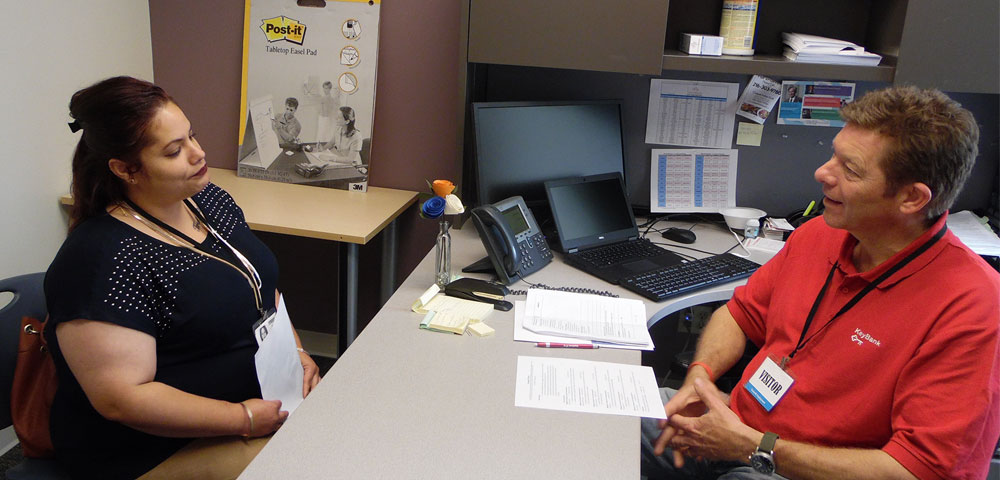Towards Employment Helps Challenged Job-seekers Return to the Workforce

When Robin Smalley, Director of Programs for Towards Employment, shares success stories from the Cleveland-based nonprofit whose mission is to help challenged job-seekers re-enter the workforce, she often begins with a participant she identifies as “Joe.”
Like many individuals Towards Employment serves, Joe had a troubled background that included substance abuse, an arrest and subsequent jail time. Through a pre-release job readiness program at the Euclid Jail operated by Towards Employment, Joe received a skills assessment and initial training. Upon his release, he worked with Towards Employment to obtain credentialed training and secured a minimum-wage job through a temp agency with a local manufacturing company.
“He did a great job and they loved him and hired him on a permanent basis,” Smalley says. “Now he’s up to $17 an hour and doing really well.”
Towards Employment receives funding from Cuyahoga County and a variety of philanthropic donors, including KeyBank and the KeyBank Foundation, which has supported the organization with a grant and through its Neighbors Make the Difference Day initiative.
Towards Employment serves more than 2000 individuals each year through its workforce programs. Since 1976 the nonprofit has helped more than 124,000 individuals prepare for a job, get a job, keep a job or move up the career ladder.
Participants arrive at Towards Employment facing a variety of challenges, ranging from the lack of a high school diploma or technical training, to limited work experience, to criminal backgrounds, to an absence of housing, transportation or social support.
The goal, Smalley says, is to “help them find a career pathway that will enable them return to a stable life and earn a family sustaining wage.”
One of the first steps toward job readiness in each program is a thorough assessment designed to identify an individual’s strengths, what skills and interests they possess, and what challenges might get in the way of their success in the work environment. This exercise also helps them understand employer expectations, training requirements, advancement opportunities and wage expectations based on their career choices.
“We have this very robust model that’s been successful at helping people figure out what they’re good at and what they need to work on, and we build on that,” Smalley says.
One program at Towards Employment, the one Joe participated in, focuses on people from prison pre-release to post-release, helping individuals receive specialized training and academic remediation that helps them enter careers in fields like manufacturing, construction and culinary arts. Some have gone on to obtain credentialed training in technical skills like computer-assisted machining and specialty welding. Others have become chefs, line cooks or food preparation workers who found jobs in Cleveland’s thriving restaurant scene.
In another program called WorkAdvance, Towards Employment helps individuals living at or below poverty levels obtain careers in the manufacturing and health care fields.
Yet another program, Step up to UH, provides a more streamlined process for entry-level residents of University Circle to find employment at University Hospital, including pre-screening that helps ready individuals for interviews and provides at least 6 months of on the job coaching to ensure strong retention and positioning for advancement. Like much of the work Towards Employment does, this is a strong partnership with an employer and other community organizations. In this case, University Hospitals, Neighborhood Connections and Towards Employment work together in a true neighborhood workforce strategy. The program, which utilizes customized employer driven training and job coaching to help ensure positive outcomes, has experienced great success, producing a higher rate of retention than the departmental average for University Hospitals hires.
“Many people just walk through the doors for orientation every Monday – with no expectation of specialized services”, says Smalley. Towards Employment’s workforce re-entry program offers two workshops each month open to anyone with involvement in the criminal justice system. One is a two-week workshop designed for individuals who might have possessed significant previous work experience before experiencing a setback or an arrest, and who need only modest training and services, or a specialized certification, to prepare for employment.
The other is four weeks long and provides the more intensive assistance often required by individuals who are younger and lack formal job experience, or those who have been removed from the workforce for an extended period of time. Each of those workshops serves about 20 individuals per month.
Smalley says the goal for all the work that Towards Employment does is to achieve a fresh start for individuals like Joe and like another participant who came to Towards Employment after serving a 19-year prison sentence that began when he was 16 years old. That individual underwent skills assessment and training, took a job as a front-desk receptionist, was eventually promoted and is now handling case management services.
“Some people might have tossed him aside,” Smalley says. “But he had great family support, in addition to our services, so he was able to turn his life completely around. He’s done incredibly well, and now he’s in a position to contribute something back to the community.”